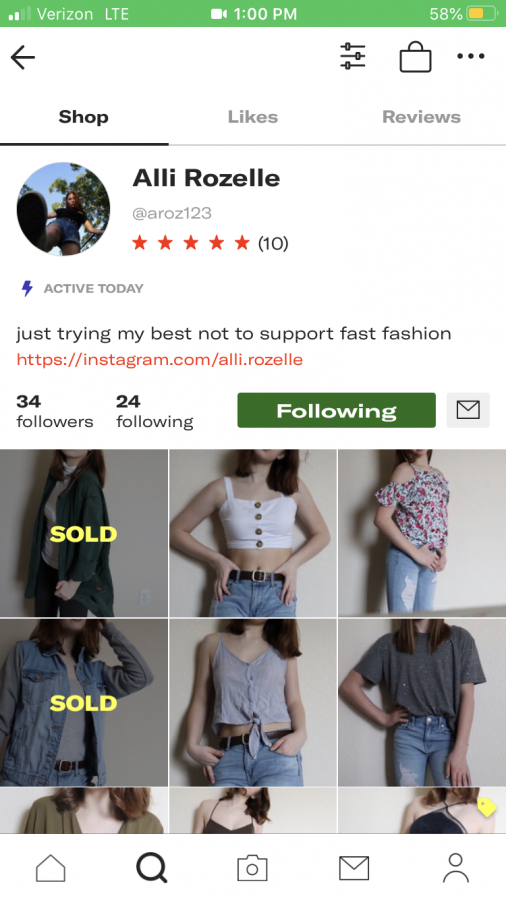WOTW: Alli Rozelle
Junior takes action to reduce her environmental impact

Junior Alli Rozelle sells used clothing on popular thrifting app Depop in order to ensure garments she no longer wears do not end up in a landfill.
With young climate change activists like Greta Thunberg overtaking headlines across the world, many students have come to realize that anyone can make a difference. While environmental degradation seems like a huge issue to tackle, junior Alli Rozelle has taken her own behaviors into account to reduce the negative impacts she has on the environment.
“About two years ago, I realized how easy it would be to switch my behaviors and have a better impact on the environment,” Rozelle said.
One of the first actions that Rozelle took to help the environment was to cut meat out of her diet. She has been vegetarian for nearly a year and a half.
“Animal agriculture is one of the leading causes of greenhouse gas emissions, and it takes up a lot of land. Plus, I value the lives of animals a lot, and it’s easier to cut meat out entirely,” Rozelle said.
Rozelle has taken another step to lessen her impact on the environment and on workers in undeveloped countries by making eco-friendly choices when purchasing clothing. According to the World Resources Institute, the fast fashion industry creates pollution and toxic waste, all while providing incredibly poor working conditions for impoverished and underage employees.
In order to boycott the fast fashion industry, Rozelle has taken to shopping primarily at second-hand stores like Arizona Trading Company in Lawrence and Savers in Shawnee. She also enjoys shopping and selling on apps called Depop and Curtsy, where individuals from all around the globe sell their unwanted clothes.
“When you thrift online, you have a better selection rather than just what’s at Goodwill. You give the clothes a second life so they don’t just go to the landfill,” Rozelle said.
Rozelle also makes sure to support local and sustainable companies whenever possible.
“I get a lot of ads on Instagram for sustainable clothing brands since I spent so much time researching the ethics policies of certain companies,” Rozelle said.
Rozelle’s favorite sustainable companies are clothing brand Reformation and personal care brand byHumankind.
Quarantine sometimes makes some people believe that living a sustainable lifestyle would be more difficult. Access to plant-based meals can be expensive and hard to come by, while the desire to shop online at stores like Target and Forever21 increases when boredom sets in.
Rozelle urges anyone trying to live more sustainably to be more intentional in their choices, especially when they are just starting out making environmentally-friendly and ethical decisions.
“Just because you buy one thing from Target, it doesn’t make you a terrible person. Sometimes you don’t have a choice or you’re not really thinking about sustainability, but that doesn’t erase your progress,” Rozelle said.

Meet Hunter Finerty, Editor in Chief. This is Hunter’s senior year, as well as her third year on staff. She has previously worked on the Green Pride...

